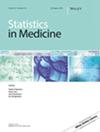基于非参数生物标志物的治疗选择与可重复性数据
IF 1.8
4区 医学
Q3 MATHEMATICAL & COMPUTATIONAL BIOLOGY
引用次数: 0
摘要
我们考虑对生物标志物进行评估,以便在检测修改的情况下选择治疗方法。从癌症患者那里获得了生存结果、治疗和 Affymetrix 基因表达数据。考虑将基因表达生物标记迁移到 Illumina 平台。最近有一种新方法可以对迁移的生物标记物进行快速评估,只需进行可重复性研究就能比较两种平台,方法是将原始生物标记物视为迁移生物标记物的误差污染观察结果。然而,其经典测量误差模型和结果线性预测因子的假设可能并不成立。忽略这种模型偏差可能会导致次优治疗选择或无法识别有效的生物标记物。为了克服这种局限性,我们采用非参数逻辑回归来模拟事件发生率与生物标志物之间的关系,并推导出基于标志物的最佳治疗选择。我们进一步假设迁移生物标记物和原始生物标记物之间存在非参数关系,并证明与无差错的生物标记物相比,受误差污染的生物标记物会导致次优治疗选择。我们通过 B-样条近似获得了估计结果。我们通过模拟研究对该方法进行了评估,并将其应用于肺癌数据进行了演示。本文章由计算机程序翻译,如有差异,请以英文原文为准。
Nonparametric Biomarker Based Treatment Selection With Reproducibility Data
We consider evaluating biomarkers for treatment selection under assay modification. Survival outcome, treatment, and Affymetrix gene expression data were attained from cancer patients. Consider migrating a gene expression biomarker to the Illumina platform. A recent novel approach allows a quick evaluation of the migrated biomarker with only a reproducibility study needed to compare the two platforms, achieved by treating the original biomarker as an error‐contaminated observation of the migrated biomarker. However, its assumptions of a classical measurement error model and a linear predictor for the outcome may not hold. Ignoring such model deviations may lead to sub‐optimal treatment selection or failure to identify effective biomarkers. To overcome such limitations, we adopt a nonparametric logistic regression to model the relationship between the event rate and the biomarker, and the deduced marker‐based treatment selection is optimal. We further assume a nonparametric relationship between the migrated and original biomarkers and show that the error‐contaminated biomarker leads to sub‐optimal treatment selection compared to the error‐free biomarker. We obtain the estimation via B‐spline approximation. The approach is assessed by simulation studies and demonstrated through application to lung cancer data.
求助全文
通过发布文献求助,成功后即可免费获取论文全文。
去求助
来源期刊

Statistics in Medicine
医学-公共卫生、环境卫生与职业卫生
CiteScore
3.40
自引率
10.00%
发文量
334
审稿时长
2-4 weeks
期刊介绍:
The journal aims to influence practice in medicine and its associated sciences through the publication of papers on statistical and other quantitative methods. Papers will explain new methods and demonstrate their application, preferably through a substantive, real, motivating example or a comprehensive evaluation based on an illustrative example. Alternatively, papers will report on case-studies where creative use or technical generalizations of established methodology is directed towards a substantive application. Reviews of, and tutorials on, general topics relevant to the application of statistics to medicine will also be published. The main criteria for publication are appropriateness of the statistical methods to a particular medical problem and clarity of exposition. Papers with primarily mathematical content will be excluded. The journal aims to enhance communication between statisticians, clinicians and medical researchers.
 求助内容:
求助内容: 应助结果提醒方式:
应助结果提醒方式:


